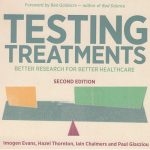
Sunn Skepsis
Denne portalen er ment å gi deg som pasient råd om kvalitetskriterier for helseinformasjon og tilgang til forskningsbasert informasjon.
| 0 Comments
How Science Works
Definitions of terms that students have to know for 'How Science Works' and associated coursework, ISAs, etc
| 0 Comments
Generation R – The need to reduce waste in clinical research involving children
1/3, 14-min video at the launch of GenerationR, a network of young people who advise researchers.
| 0 Comments
Making sense of results – CASP
This module introduces the key concepts required to make sense of statistical information presented in research papers.
| 0 Comments
Avoiding biased selection from the available evidence
Systematic reviews are used to identify, evaluate and summarize all the evidence relevant to addressing a particular question.
| 0 Comments
Preparing and maintaining systematic reviews of all the relevant evidence
Unbiased, up-to-date systematic reviews of all the relevant, reliable evidence are needed to inform practice and policy.
| 0 Comments
Using the results of up-to-date systematic reviews of research
Trustworthy evidence from research is necessary, but not sufficient, to improve the quality of health care.
| 0 Comments
Why comparisons must address genuine uncertainties
Too much research is done when there are no genuine uncertainties about treatment effects. This is unethical, unscientific, and wasteful.
| 0 Comments
What are systematic reviews?
A 3-min video by Jack Nunn and The Cochrane Consumers and Communication group for people unfamiliar with the concept of systematic reviews.
| 0 Comments
Goldilocks
Cartoon and blog about how poorly performed systematic reviews and meta-analyses may misrepresent the truth.
| 0 Comments

Secret life of trials
The results of single comparisons of treatments can be misleading.
| 0 Comments
Forest Plot Trilogy
Synthesising the results of similar but separate fair comparisons (meta-analysis) may help by yielding statistically more reliable estimates
| 0 Comments
Introduction to clinical trials: lay-friendly video
This lay-friendly video introduction to clinical trials was created by the European Communication on Research Awareness Needs Project.
| 3 Comments
Overview of study designs
11 slides and a 4-min commentary overviewing study designs for clinical research. (from Univ Mass Med School).
| 1 Comment
Systematic Reviews
3 slides and a 4-min commentary about systematic reviews and meta-analyses (from Univ Mass Med School).
| 0 Comments
Science Weekly Podcast – Ben Goldacre
A 1-hour audio interview with Ben Goldacre discussing misleading claims about research.
| 0 Comments
Smart Health Choices: making sense of health advice
The Smart Health Choices e-book explains how to make informed health decisions.
| 0 Comments
The basic principles of Evidence Based Medicine
A webpage explaining the foundations of systematic reviews.
| 0 Comments
In defence of systematic reviews of small trials
An article discussing the strengths and weaknesses of systematic reviews of small trials.
| 0 Comments
Evidence from Randomised Trials and Systematic Reviews
Dr Chris Cates' article discussing control of bias in randomised trials and explaining systematic reviews.
| 0 Comments
Reducing the play of chance using meta-analysis
Combining data from similar studies (meta-analysis) can help to provide statistically more reliable estimates of treatment effects.
| 0 Comments
Ben Goldacre talks about Bad Pharma on C-SPAN
In this 90 minute videoed lecture, Ben Goldacre talks about key issues raised in his book 'Bad Pharma'.
| 0 Comments
On taking a good look at ourselves
Iain Chalmers talks about failings in scientific research that lead to avoidable harm to patients and waste of resources.
| 1 Comment
Psychiatric disorders
Regrettably, research is not always well done or relevant. Take the example of a distressing condition known as tardive dyskinesia. […]
| 0 Comments
Pre-eclampsia in pregnant women
Another outstanding example of good research concerns pregnant women. Worldwide, about 600,000 women die each year of pregnancy-related complications. Most […]
| 2 Comments
Stroke
Stroke is a leading cause of death and long-term disability. The death rate is between one in six and two […]
| 0 Comments
Instructions to authors to put research in context by the editors of the medical journal The Lancet
Systematic Review This section should include a description of how authors searched for all the evidence. Authors should also say […]
| 0 Comments
Could checking the evidence first have prevented a death?
‘In a tragic situation that could have been averted, Ellen Roche, a healthy, 24-year-old volunteer in an asthma study at […]
| 0 Comments
Science is cumulative, but scientists don’t accumulate evidence scientifically
‘Academic researchers have been talking about something called “cumulative meta-analysis” for 25 years: essentially, you run a rolling meta-analysis on […]
| 0 Comments
The importance of systematic reviews
‘Systematic reviews and meta-analyses have become increasingly important in health care. Clinicians read them to keep up to date with […]
| 0 Comments
Synthesizing information from research
More than a century ago, the president of the British Association for the Advancement of Science, Lord Rayleigh, commented on […]
| 0 Comments
Avoidable harm to people participating in research
Failure to assess all relevant, reliable evidence can also result in avoidable harm to people who participate in research. Researchers […]
| 0 Comments
What can happen if all the relevant, reliable evidence is not assessed?
In this section Avoidable harm to patients Avoidable harm to people participating in research Wasted resources in healthcare and research […]
| 2 Comments
Is one study ever enough?
The simple answer is ‘hardly ever’. Very seldom will one fair treatment comparison yield sufficiently reliable evidence on which to […]
| 1 Comment
Assessing all the relevant, reliable evidence
Key points A single rarely provides enough evidence to guide choices in healthcare Assessments of the relative merits of alternative […]
| 0 Comments
Obtaining large enough numbers in fair tests of treatments
Sometimes in tests of treatments it is possible to obtain large enough numbers from research done in one or two […]
| 1 Comment
Taking account of the play of chance
Key point Account must be taken of ‘the ’ by assessing the confidence that can be placed in the quality […]
| 1 CommentNo Resources Found
Try clearing your filters or selecting different ones.
Browse by Key Concept
Back to Learning Resources homeJargon buster
About GET-IT
GET-IT provides plain language definitions of health research terms
